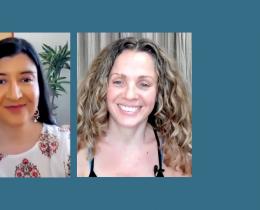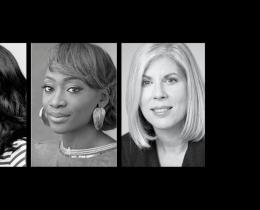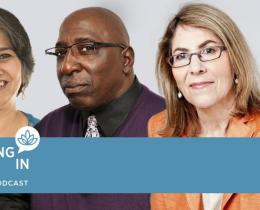Omega: When you think about the women you interviewed for your book How Great Women Lead, written with your daughter Darcy Deane, do you see any one trait, characteristic, or belief they all have in common?
Bonnie: They were all so different! Perhaps the most common thread was knowing themselves—really fitting into their own skin. Most of them had worked hard to get there. They valued their own unique strengths and knew how to surround themselves with talented people who enhance their authentic leadership style. That’s the best word: authentic.
Omega: Do you see a lack of confidence as a challenge for women?
Bonnie: I do. So many women don’t see themselves as leaders even when they’re already leading!
For example, I have a friend who is a very successful professional speaker. She collaborated with NASA to start a TED Talk program for teenagers: producing, prepping, funding. She was leading the whole program. But when I asked her, “Do you see yourself as a leader?” she said, “Oh, this is just a sideline from my real work as a speaker.”
I find that women are frequently organizing everything and doing everything, but they don’t see themselves as leading. Men, if they do that, call themselves leaders. My daughter and I wrote our book, How Great Women Lead, to encourage more women to embrace themselves as leaders and embrace the part of them that naturally enjoys running the show.
Omega: As more women enter high levels of leadership, and more dads stay at home, what do you see as the growth edge of women’s leadership in society today?
Bonnie: Owning leadership as something that women do in our own way, as opposed to having to be like men, is a growth edge. It’s a growth edge not just for women, but also for organizations because companies have been set up to hire, recruit, and develop people to excel in the ways that men do. As long as they keep the systems the same, the women who will excel are the women who most act like men. Until organizations change some of the systems for hiring, recruiting, and promoting, they will always get what they’ve always got. We won’t truly leverage women’s comparative advantage until we start to understand and value it better. Having more women in senior positions fosters the process of evolution.
Omega: How do we help the next generation of women to overcome the barriers?
Bonnie: One of the things we saw in the data about Gen Y women was that they are better equipped to reach senior leadership positions than any other generation before them. They have more education, more opportunities, and more confidence. All of those factors are lined up. But if you ask them, “Do you want the senior positions in business or in politics?” Most of them will say, “No.”
I saw it really clearly with my own daughter—she looked at the type of people in senior leadership positions today and thought, “That’s not me.”
Her epiphany was, after meeting with women like Marin Alsop and Condoleezza Rice, that their leadership positions changed to fit them. That’s an important message we have to get out to Gen Y women. We need you to get in that job and bring your unique self. We need you to come and help solve the problems of the world, because we can’t just have the same sort of people bringing the same ideas to everything.
Omega: You’ve talked about our society being in the midst of a civil rights movement for those with disabilities of all kinds. What do you think is the greatest challenge this movement faces today? How do you think we can work together to overcome it?
Bonnie: The Americans With Disabilities Act was passed more than 25 years ago. That caused great strides in physical access to buildings, transit, voting, etc., but we still have a long way to go.
The next step forward has to be around understanding what discriminating against people with disabilities means. We have a word for sexism. We have a word for racism. There is no word for discriminating against people with disabilities. (Able-ism?) Because we just don’t see it. We often think we’re being kind when we’re patronizing. When you don’t promote the employee who uses a wheelchair into a job that requires business travel, you may think you are being thoughtful. But did you ask them?
I was on the board of the National Organization on Disability when NBC asked for their help. NBC recognized that 20 percent of the US population lives with disabilities and only two percent of news stories feature anyone with disabilities. They realized their reporters, writers, producers, and anchors, didn’t feel comfortable talking about disability. They didn’t want to offend people so they just didn’t do anything. What is the cumulative impact of that? People with disabilities aren’t on the news.
That’s unintended discrimination. Kudos to NBC for addressing this and getting training for their news staff. On a national level, we haven’t reached that level of awareness around people with disabilities—that our cumulative discomfort, overcaring, and protectiveness actually amounts to unconscious discrimination. It is similar to the way women were treated in the 1950s; as ‘the weaker sex" women were protected, but also heavily patronized and discriminated against.
Businesses are where I see the biggest changes happening. I’ve worked a lot with corporations looking at how they hire and how they promote, and where their policies and procedures could be more helpful. Recently, the government has increased the disability hiring expectations for any firm that has federal contracts—and that’s most of the big ones. As corporations change, it affects our national conversation.
Omega: As someone who has interviewed so many women, is there a question you have asked that you would like the opportunity to answer?
Bonnie: A great question for Omega to ask me is, “How do you keep yourself spiritually strong?” That’s a foundational question and, for me, it changes over time.
I was at a point only a couple of years ago when I wasn’t getting what I needed, and I felt frustrated and depleted. I can’t be in a prayer group every week, because I’m flying all around the world. I only manage to make it to church on Sundays when I happen to be in town. I tried to create a virtual prayer group with friends, but everyone was just too busy. One day I broke down sobbing; I felt so empty.
I found myself driving to a monastery on the Hudson River that I had been to for retreats in the past. The breathtaking views of the river valley, the ancient chanting of the monks, and the holy ground sanctified by a century of prayer wrapped me in a healing embrace. I realized my perfect prayer group was right there. Their lives revolve around a schedule of prayer, worship, and meditation five times a day … so anytime I can show up, they are available to pray with me. Now I am an affiliate and frequent guest. I know it isn’t cool these days to be religious as well as spiritual. But that’s my story. You have to write and keep re-writing yours. Find things that work to fill up your spiritual tank. Make sure your spiritual tanks aren’t getting overly depleted—you’re going to need different solutions at different times in your life.



